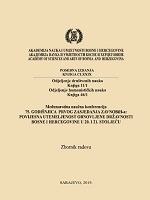ZAVNOBIH KAO HISTORIJSKI ODGOVOR NA VELIKODRŽAVNE POLITIKE PODJELE I UNIŠTENJA BOSNE I HERCEGOVINE
ZAVNOBIH LIKE A HISTORICAL ANSWER ON STATE POLITICS ON DIVIDING AND DESTRUCTION OF BOSNIA AND HERZEGOVINA
Author(s): Denis Bećirović
Subject(s): Political history, Interwar Period (1920 - 1939), WW II and following years (1940 - 1949), History of Communism, Fascism, Nazism and WW II, Wars in Jugoslavia
Published by: Akademija Nauka i Umjetnosti Bosne i Hercegovine
Keywords: Bosnia and Herzegovina; Antifascism; ZAVNOBiH; AVNOJ; Yugoslavia; CPY;
Summary/Abstract: Along with the formation of the Kingdom of SHS, the policy of denying the historical specialties and integrity of Bosnia and Herzegovina continued in the new state legal framework and changed historical circumstances. By introducing the “Six days of January” dictatorship in 1929, the policy of decommissioning of the territorial integrity of Bosnia and Herzegovina was formalized and the culmination of the denial of the historical, state-legal and political-territorial entity of Bosnia and Herzegovina occurred through the signing of the Cvetković-Maček agreement in 1939. The denial and destruction policy of Bosnia and Herzegovina continued to carry out the Ustasa and Chetnik movements in the Second World War. The common position of the protagonists of the Greater Serbia and Croatian politics in the interwar and war period was a sharp opposition to any idea that envisioned a territorially integrated and autonomous Bosnia and Herzegovina. Criminal ideologies and the policies of destruction of Bosnia and Herzegovina were opposed by anti-fascists from all the people of Bosnia and Herzegovina. At the ZAVNOBiH sessions, they restored Bosnia and Herzegovina’s statehood and created joint federal units with joint forces, which became part of the Democratic Federal Yugoslavia in the second session of the AVNOJ with the political will of the Bosnian delegates. The decisions of the ZAVNOBiH constituted a historical negation of the great state policies of the division and destruction of Bosnia and Herzegovina. They made possible the resurgence of the former Bosnian state and provided it with the necessary state-legal and political elements for its renewed existence after the collapse of the medieval Bosnian state in 1463. In short, the anti-fascist forces restored the territorial integrity and statehood of Bosnia and Herzegovina at the ZAVNOBiH sessions. By adopting the first Constitution after the end of the Second World War, Bosnia and Herzegovina defined its internal organization, the highest legal act, in accordance with the political and economic conditions at that time. It is defined as the nation’s republican state which had sovereign rights and statehood. By the adoption of the first post-war constitution of the People’s Republic of Bosnia and Herzegovina, the construction of the state of Bosnia and Herzegovina was completed.
- Page Range: 267-290
- Page Count: 24
- Publication Year: 2019
- Language: Bosnian
- Content File-PDF

